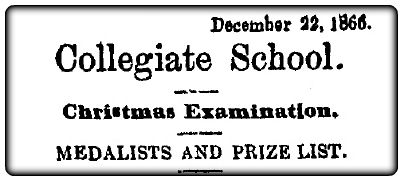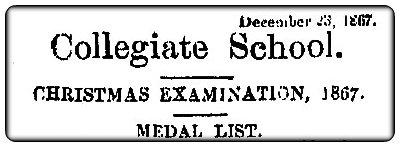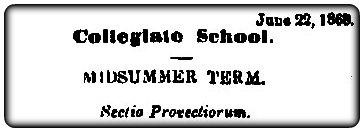1860s links
Two years after John Radcliffe started the Collegiate School in 1853, Andrew Milne, a graduate of Aberdeen University, was appointed assistant minister and joined the staff of the school. In 1863, William Morrison, another Aberdeen graduate, completed the team which shaped Collegiate.
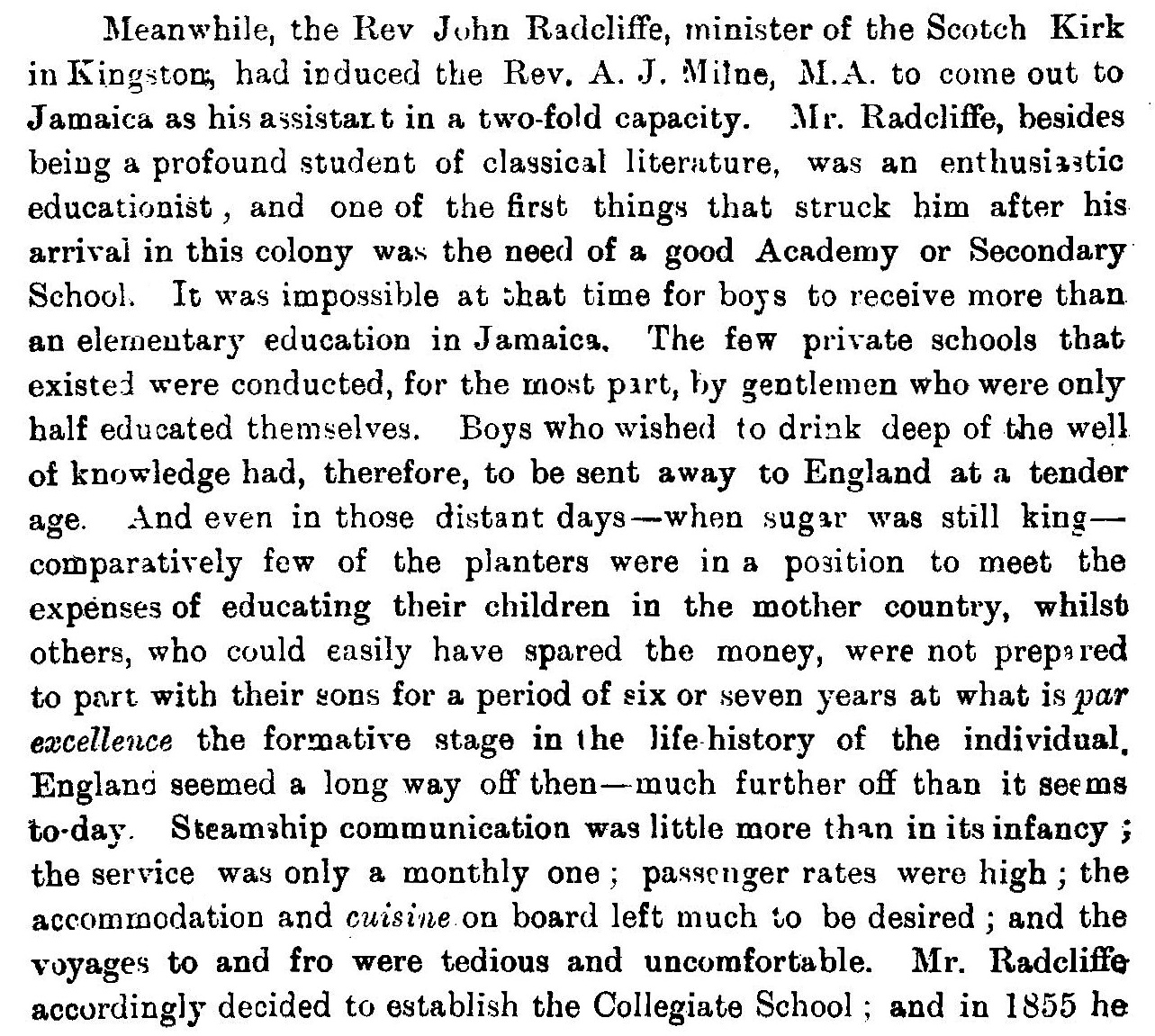
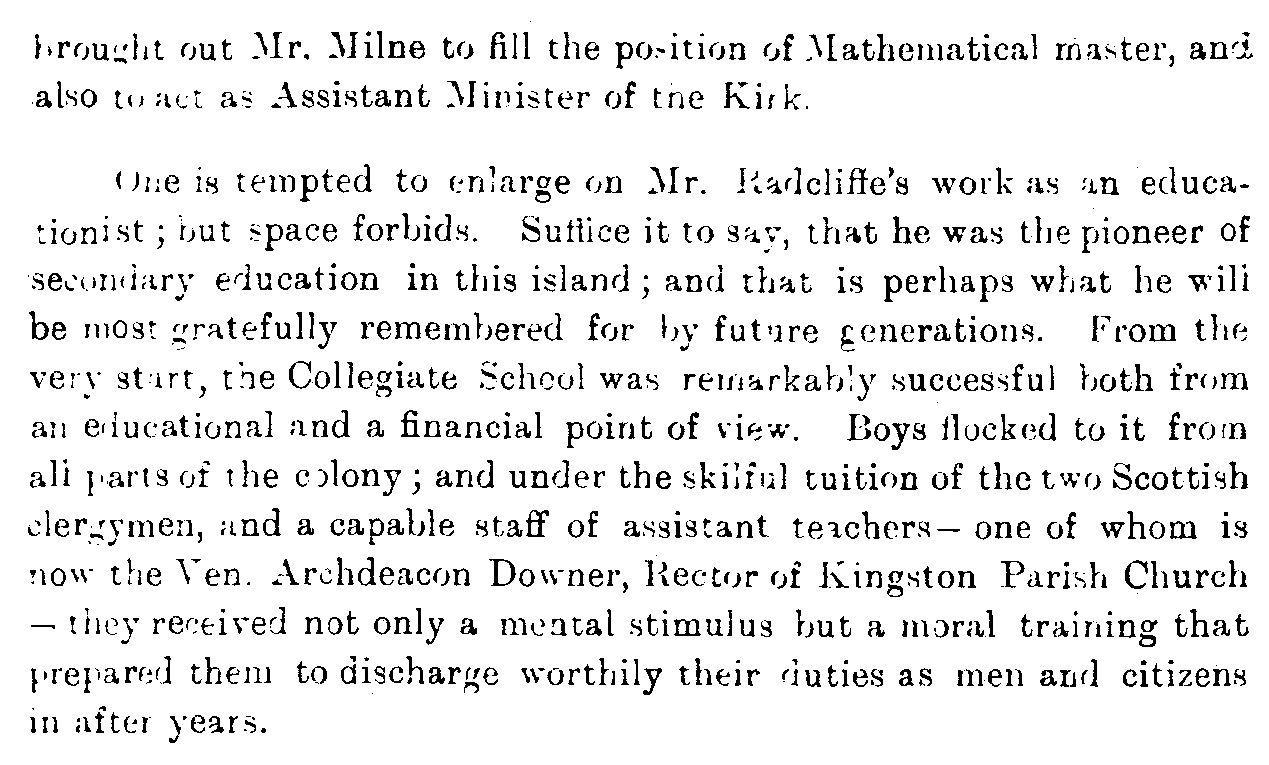
excerpt from a biographical introduction by Robert C Guy, a fellow Scot, to Poems by the late William Morrison, M.A.
published in Jamaica in 1906
[I apologise for the poor quality of this piece of text; my copy of the original is just that bad!]

However the following extract provides a partial explanation:
Daily Gleaner, January 14 1896
Wm. Morrison Esq., M.A. delivered a sympathetic speech to his fellow workmen. He was appointed Secretary to the old Board of Examiners in 1865 at £3 per month, and the Government devoted £3,000 per annum to elementary education. That year 68 teachers came up to be examined of whom 6 passed, 2 of them being still alive. He heartily congratulated the teachers on the great progress they were making as shown by the Conference that day.
[from report on 1896 Jamaica Union of Teachers Conference.]
11 February 1864
The Collegiate School: A large boarding and
day school, whose object as designed, and in
so many instances carried out, is to give an
education similar to that in Great Britain and to
prepare for the Army, the University, and for the
merchant's office. The scholars number 98, 26
of whom are boarders. Presided over by Rev. Mr. Milne.

This advertisement in January 1866 listed four teachers, Radcliffe, Milne and Morrison forming the core then, and later. I have found no further references so far to the Rev W Harper, except that he left Jamaica for British Guiana in 1868.
Colonial Standard, January 11, 1866

Daily Gleaner, March 12, 1866

Daily Gleaner, May 31,
1866
The Governor & the Public Schools
We
learn that His Excellency Sir Henry Storks,
G.C.B., visited the Rev Dr Milne yesterday,
with
General O'Connor, C.B. and placing
himself
under the immediate guidance of the worthy
Doctor, requested that he would
afford him
some information regarding education
in
Kingston, and conduct him through a
few of
the principal institutions where he
might inspect
and examine the pupils. Dr.
Milne in yielding to
the desire of His
Excellency conducted him to
the Collegiate
School where he examined the
boys in
the higher branches of study (Latin,
Greek
and Mythology,) to
Wolmer's School,
where he expressed himself
greatly pleased
– particularly so with the
appearance of the girls –
and to the
Mico Institution under the
superintendence of
Mr. Martin, where he
expressed himself
equally delighted. His
Excellency has requested
Dr. Milne to prepare
some practical
suggestions, for the guidance
of this
Government, in propagating the interests
of
sound education throughout the Colony. His
Excellency could not have confided this
important task to more competent hands than
the Rev. Dr. Milne.
Daily Gleaner, December 26, 1866
The
Christmas Examination of the pupils of the Collegiate School took place on the 19th. The spacious hall was densely filled with
visitors. His Excellency the
Governor took
the chair, supported by Major-General
O'Connor,
C.B.; the Hon. L. Q. Bowerbank, Custos
of
Kingston, and the Hon, Henry Westmorland,
Custos of
Metcalfe. After the examination of
writings, &c., and
some excellent display
of Elocution, which was
greatly applauded,
the prizes were distributed by his
Excellency. >>>
addressed them briefly to the following effect:-
He was there, he said, in the same relation to Mr. Milne, as the boys were; he was told to do certain things
and his duty was to obey. He was greatly satisfied at witnessing the progress the young men were making in their studies, and glad to find that there was such an
institution in the island as the Collegiate School, of which any Colony might be proud. His friend Dr. Milne had informed him that there was great necessity for the establishment of a College in this island, and he perfectly agreed with him - an institution in which they could spend the few years remaining to them before they enter the difficult path of early manhood. If the Colony should speedily return to the enjoyment of prosperity he would have much pleasure in giving support and encouragement to the establishment of such a desirable institution. His Excellency announced a vacation till the 23rd January next.
[The
Governor in this instance was Sir John Peter Grant who
arrived in Jamaica in
August 1866]
Click on the image below for the complete prize list.
Daily Gleaner, January 16, 1868
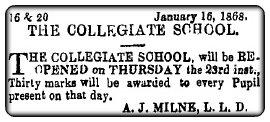
Daily Gleaner, January 07, 1869

(click on image)
W Gordon and J Gordon appear in the Class
Prize Lists for Christmas 1867 and June 1869. I believe that 'Joseph Gordon' is Joseph Milward Gordon, the prominent Black politician in St Catherine in the 1880s, who is stated to have
attended the Collegiate School.
The extract below, from official U.K. government records, indicates the
status of the Collegiate School in the mid-1860s.



